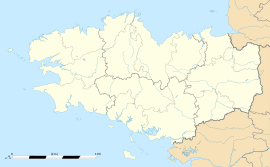Plouharnel
Plouharnel
Plouharnel | |
|---|---|
 The Chapel of Our Lady of Flowers, in Plouharnel | |
| Coordinates: 47°35′56″N 3°06′41″W / 47.5989°N 3.1114°W | |
| Country | France |
| Region | Brittany |
| Department | Morbihan |
| Arrondissement | Lorient |
| Canton | Quiberon |
| Intercommunality | Auray Quiberon Terre Atlantique |
| Government | |
| • Mayor (2020–2026) | Chantal Le Piouff-Le Bihan[1] |
| Area 1 | 18.32 km2 (7.07 sq mi) |
| Population (2021)[2] | 2,261 |
| • Density | 120/km2 (320/sq mi) |
| Time zone | UTC+01:00 (CET) |
| • Summer (DST) | UTC+02:00 (CEST) |
| INSEE/Postal code | 56168 /56340 |
| Elevation | 0–33 m (0–108 ft) |
| 1 French Land Register data, which excludes lakes, ponds, glaciers > 1 km2 (0.386 sq mi or 247 acres) and river estuaries. | |
Plouharnel (French pronunciation: [plu.aʁnɛl]; Breton: Plouharnel) is a commune in the Morbihan department of Brittany in north-western France.[3]
Geography
[edit]Plouharnel is a seaside town located in the south of Morbihan, 12 km (7.5 mi) southwest of Auray, 25 km (16 mi) southeast of Lorient and 27 km (17 mi) west of Vannes. The commune is bordered by Atlantic Ocean except to the north and the east. The northern part of the isthmus connecting the mainland to the ancient island of Quiberon is located in the commune's southern part.
Transports
[edit]There are two railway stations in the commune of Plouharnel, both on the Auray–Quiberon railway which is operated in summer only: Plouharnel-Carnac and Les Sables-Blancs. At Auray station connections to Paris and other places in France are offered.
Population
[edit]| Year | Pop. | ±% p.a. |
|---|---|---|
| 1968 | 1,487 | — |
| 1975 | 1,492 | +0.05% |
| 1982 | 1,525 | +0.31% |
| 1990 | 1,653 | +1.01% |
| 1999 | 1,700 | +0.31% |
| 2007 | 1,923 | +1.55% |
| 2012 | 2,126 | +2.03% |
| 2017 | 2,160 | +0.32% |
| Source: INSEE[4] | ||
Inhabitants of Plouharnel are called in French Plouharnelais.
Monuments
[edit]
Photograph by Zacharie Le Rouzic (1864–1939)
The commune contains a number of megalithic monuments including those at Le Vieux-Moulin, comprising six stones weighing up to ten tons.[5]
See also
[edit]References
[edit]- ^ "Maires du Morbihan" (PDF). Préfecture du Morbihan. 7 July 2020.
- ^ "Populations légales 2021" (in French). The National Institute of Statistics and Economic Studies. 28 December 2023.
- ^ INSEE commune file
- ^ Population en historique depuis 1968, INSEE
- ^ From Carnac to Callanish: The Prehistoric Stone Rows and Avenues of Britain, Ireland, and Brittany, Aubrey Burl, Yale University Press, 1993, p.1
External links
[edit]- Official website (in French)
- Base Mérimée: Search for heritage in the commune, Ministère français de la Culture. (in French)
- Mayors of Morbihan Association (in French)




